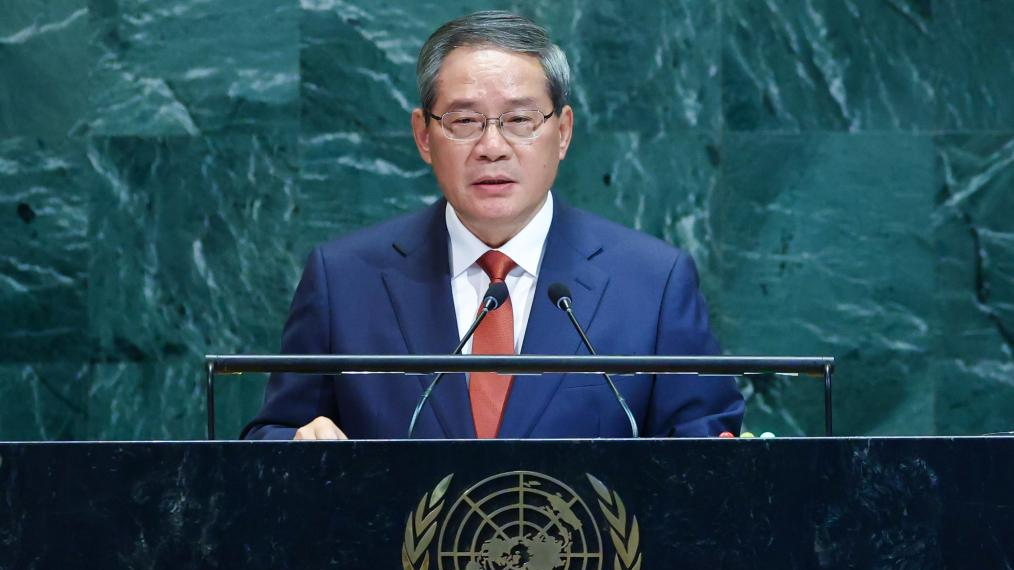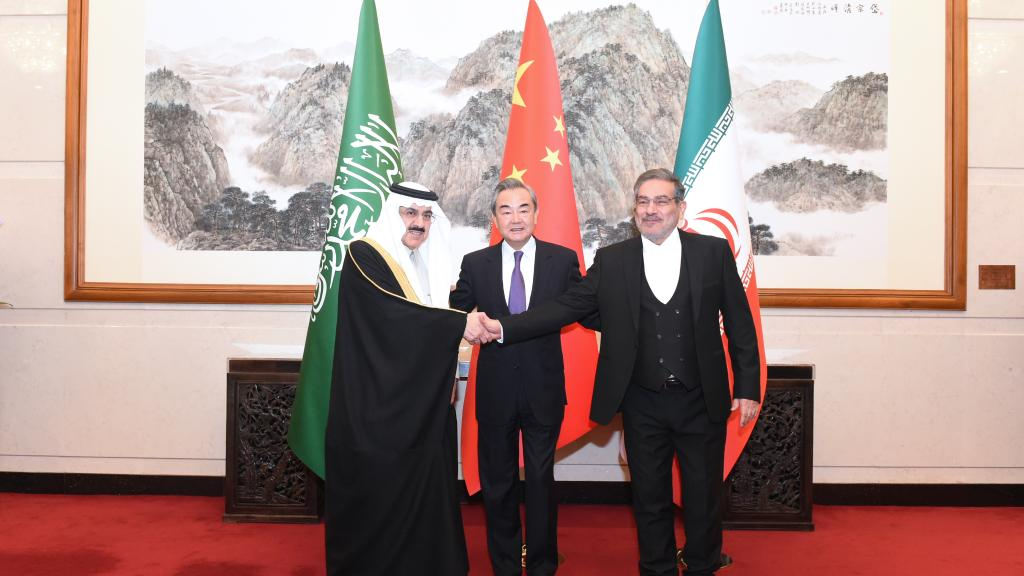
Chinese Premier Li Qiang speaks at the general debate of the 80th session of the UN General Assembly at the UN headquarters in New York, September 26, 2025. /Xinhua
By Xin Ge
Editor's note: Xin Ge, a special commentator for CGTN, is a research fellow at the Institute of Public Policy and Governance, Shanghai University of Finance and Economics (SUFE), and a chair associate professor at the School of Public Administration and Policy, SUFE. The article reflects the author's opinions and not necessarily the views of CGTN.
Chinese Premier Li Qiang's address to the UN General Assembly at the historic confluence of the 80th anniversaries of the United Nations' founding and the end of World War II was more than a commemoration; it was a profound reflection on the lessons of the past and a clear, resolute answer to the defining question of our time: What has gone wrong with our world, and what should we do about it?
His message was also a solemn declaration from a country that is a builder of world peace, a contributor to global development, and a defender of the international order, injecting much-needed certainty into a world navigating turbulent change.
Li began with a powerful appeal to honor the UN's founding ideals, reminding the assembly that the UN was created upon an ideal of "a world free of war," and is a historic experiment to "escape the law of the jungle." This multilateral framework, he said, has enabled decades of general peace and unprecedented global development.
Today, however, that framework is under siege. A resurgence of unilateralism, protectionism, and a Cold War mentality threatens to unravel the international order.
At this critical crossroads, to awaken the world's collective conscience, Li forcefully asked: "How could we, when confronted with unscrupulous acts of hegemonism and bullying, remain silent and submissive for fear of might? And how could we let the ardent passion and dedication of our forefathers in founding the UN simply fade into the pages of history?"
These questions underscored China's commitment as a founding UN member to uphold the world body's original mission. For decades, China has been an unwavering advocate for true multilateralism, from being the top contributor of peacekeepers among the five permanent members of the UN Security Council to championing the equality of all countries, large and small.
Li put forth China's systematic solutions to the world's governance deficit. In recent years, Chinese President Xi Jinping has introduced the vision of building a community with a shared future for mankind, underpinned by four key pillars: the Global Development Initiative, the Global Security Initiative, the Global Civilization Initiative, and the newly proposed Global Governance Initiative. Together, they form a coherent roadmap for building a better world.
On peace and security, the Global Security Initiative advocates dialogue over confrontation and partnership over alliance. As Li stated, "Persisting in camp-based confrontation or willful resort to force only drives peace further away." This stands in contrast to the bloc politics and zero-sum games pursued by some nations.
China practices what it preaches. From successfully mediating the restoration of diplomatic ties between Saudi Arabia and Iran to promoting peace talks in global hotspots, Beijing has consistently acted as an anchor for stability.

Chinese Foreign Minister Wang Yi (C) with Musaad bin Mohammed Al-Aiban (L), Saudi Arabia's Minister of State, member of the Council of Ministers and National Security Advisor, and Admiral Ali Shamkhani, then Secretary of the Supreme National Security Council of Iran, in Beijing, China, on March 10, 2023. Wang, also a member of the Political Bureau of the Communist Party of China (CPC) Central Committee and Director of the Office of the Foreign Affairs Commission of the CPC Central Committee, attended the closing meeting of talks between the Saudi and Iranian delegations respectively led by Al-Aiban and Shamkhani. /Xinhua
On economic development, facing the headwinds of de-globalization, China remains steadfast in opening its doors wider to the world. A major cause of the current "global economic doldrums," Li said, "is the rise in unilateral and protectionist measures."
As a counterpoint, China has contributed around 30 percent of global economic growth in recent years and has been the world's second-largest importer for 15 consecutive years. The Belt and Road Initiative has evolved into the world's largest platform for international cooperation. These actions are powerful refutation of protectionist narratives like "decoupling," demonstrating China's desire to foster inclusive globalization.
On cultural exchange, the Global Civilization Initiative champions respect for the diversity of civilizations. This philosophy, rooted in the Chinese value of harmonious coexistence, rejects the "obsession with so-called 'civilizational superiority' or ideology-based circles," which, Li warned, "only breeds more division and confrontation." By promoting the common values of humanity and fostering cross-cultural projects, China is endeavoring to build consensus and synergy for human progress.
On emerging global challenges, from climate change to AI governance, China has shouldered its responsibilities. It has built the world's largest renewable energy system and recently announced ambitious 2035 climate goals at UN Climate Summit 2025. It has put forward the Global Governance Initiative to ensure "technology for good and equitable benefits," Li said.
His announcement that China would gift lunar soil samples to the UN is a vivid symbol of its commitment to sharing the fruits of scientific progress with the world.
The ship of history has sailed into new waters. Li Qiang's speech at the general debate of 80th Session of the UN General Assembly was a lighthouse, illuminating the path forward: a steadfast commitment to the UN's founding ideals and multilateralism.
Li concluded that "a steadily developing and highly open China will bring more fresh opportunities to countries around the world."
China stands ready to work with all peace-loving nations to implement these global initiatives, advance building a community with a shared future for mankind, and jointly create a more harmonious and beautiful world for all.



